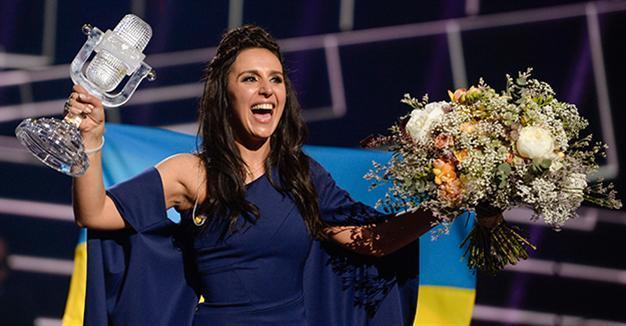Ukraine stuns Russia to win politically charged Eurovision
STOCKHOLM – Agence France-Presse
 Ukrainian singer Jamala snatched victory from archrival Russia to win the Eurovision Song Contest on May 14, adding a touch of political drama to the annual kitsch extravaganza.
Ukrainian singer Jamala snatched victory from archrival Russia to win the Eurovision Song Contest on May 14, adding a touch of political drama to the annual kitsch extravaganza.After a tense vote count, during which it seemed Australia was going to run away with the crown until the audience votes came in, Jamala was declared the winner in Stockholm after a heart-felt performance of “1944,” a song about the deportations of Crimean Tatars during World War II.
Jamala sung mostly in English but the chorus was in a Crimean Tatar Turkic dialect.
Jamala’s entry, which stirred controversy over perceived veiled criticism of Russia’s recent annexation of Crimea, scored 534 points, closely followed by Australia’s Dami Im with 511 points, the juries’ favorite.
The hotly tipped former Russian child star Sergey Lazarev came in third with 491 points.
Germany was the worst performer of the evening, with Jamie-Lee Kriewitz’s “Ghost” scoring just 11 points, followed by the Czech Republic with 41 points.
In Moscow, public TV channel Rossiya 1’s commentators congratulated Jamala on her win, without mentioning the Crimean Tatars.
They said Jamala’s song was “about her family members,” without offering further details.
Jamala herself described the win as “amazing.” “I was sure that if you sing, if you talk about truth, it really could touch people,” the 32-year-old said at the winner’s press conference.
The stunning turnaround in the final minutes of the show capped an eventful 61st edition of the love-it-or-hate-it kitschfest, which was expected to be the most-watched Eurovision since the event was first staged in 1956.
Scores were decided by national juries as well as viewers. In an attempt to give the outcome a more democratic feel this year fans were given the final say, adding some last-minute suspense to the contest.
Timberlake guest star
Among the evening’s other highlights was a guest appearance by U.S. pop star Justin Timberlake, who entertained the crowd with his hit “Rock Your Body” before performing his new single, the upbeat “Can’t Stop the Feeling,” which itself wouldn’t have sounded out of place in the Eurovision line-up.
In another sign of the contest’s growing appeal, Eurovision was for the first time broadcast live in the United States on the Logo channel, which is aimed at the LGBTI (lesbian, gay, bisexual, transgender and/or intersex) community.
The show was also live-streamed on YouTube, giving Google a piece of the pie once reserved for European public broadcasters.
“The Eurovision Song Contest is now a truly global phenomenon,” producer Jon Ola Sand said, amid expectations that the show would push last year’s record of 197 million viewers worldwide.
Characterized by critics as a potpourri of bizarre performance antics, special effects and cheese, the light-hearted contest usually tries to avoid controversy and steer clear of geopolitics but this year was always going to be different.
Political leaders in Moscow and Crimea had initially sought to get Jamala’s song disqualified, arguing it criticized Russia’s annexation of the Black Sea peninsula in March 2014.
The jury approved the lyrics nonetheless, setting the stage for a monumental confrontation.
Inspired by Jamala’s great-grandmother’s story, “1944” recounts the deportation of Crimean Tatars by Soviet strongman Joseph Stalin, and she sings it partly in the Tatar language because “it’s in my blood,” she said.
The song has resonance for contemporary Ukraine, where memories of that horror were revived by Russia’s seizure of Crimea, and Jamala’s poignant lyrics tell the story of a people with a history of persecution that continues to this day.
Ukrainian President Petro Poroshenko was among the first to congratulate Jamala on her victory.
“Yes!!!” Poroshenko tweeted. “An unbelievable performance and victory! All of Ukraine gives you its heartfelt thanks, Jamala.”
Ahead of show time, bookies had tipped Russia’s Lazarev and his catchy “You Are the Only One” tune to win the contest between the 26 finalists - 25 Europeans and one Australian.
Lazarev, popular in his own country and eastern European nations, has built an eventful career as a singer, actor and TV host.
He has also drawn admiration from gay rights campaigners for speaking out against his country’s climate of homophobia. Bulgaria, Sweden and France made up the competition’s top six.
















